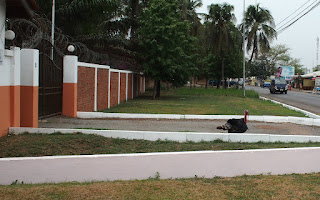昨年の9月に合格したことを知ってから3か月の準備期間、2か月のトレーニング、更に1か月のオリエンテーション。遂に明日、ワに到着し、本赴任です。やっとスタートラインに立った今、これからの2年間の大きな目標をひとつ、ここに書き留めておきたいと思います。少し個人的な話になってしまいますがご了承ください。
After finding out that I was accepted into
the program last September, there was a three-month preparation period, two
months of training, and a further month of orientation. Tomorrow, I will
finally arrive at Wa and officially start my assignment. Now that I am finally
at the starting line, I would like to keep a record here about one big goal
that I have for the next two years. Please forgive me for being a little
personal.
 |
| At Yakushima / 屋久島にて |
小学3年生のとき、英語の授業で1時間以内に物語の序章を書くという課題が出たことがあります。すぐにアイディアは浮かびました。ミステリーの超大作!女性の探偵が挑む、愛と涙の物語。暗号あり、迷路あり、暗闇での葛藤あり!きっと面白い話になる!楽しく想像している内にあっという間に1時間が経ってしまい、肝心の課題はほとんど書けず、つまらない物になってしまいました。それ以来、短編は上手く書けても長編は未だに納得いくレベルで書けていません。
When I was in third grade, we had an
assignment in English class where we were told to write the introduction to an
original story within an hour. I quickly thought of an idea. A great mystery
novel! A moving story with love and tears about a female detective! Codes,
mazes, fights in the dark, the whole deal! It’s going to be a great story! I
was having so much fun imagining how the story could be that the hour passed by
quickly, and of course my assignment turned out to be of poor quality, written
hastily. Since then, I have written a few good short stories, but I still haven’t
been able to write a convincing paper that is more than 10 pages long.
 |
| A street at Miyajima / 宮島で撮った道 |
人生においても、似たようなところがある気がします。子供の頃から夢ばかり見てる子でした。なりたい職業はフライトアテンダント、作家、考古学者・・・ 夢が変わる度に素晴らしい未来ばかり思い描いて、そこにたどり着くまでの道を真面目に考えていませんでした。国際関係で働く夢も中学からずっと想っている割に、現実的に国際関係でどの様な仕事をしたいのか、どこで働きたいのか、何を専門とするのか、そのためには何を勉強し、どう進めばいいのか、といった大事な過程について考えるのを長い間避けていた気がします。
I feel like I can say the same thing about
life. I was always dreaming when I was a kid. I wanted to become a flight
attendant, a writer, an archeologist… Every time my dream changed I would imagine
my wonderful future in detail, without ever seriously thinking about how I
would get there. Although I have been dreaming to work in international
relations since middle school, when it came time to actually think about what
kind of job I want to do in this field, where I want to work, what I want to be
an expert on, what I would have to study to get there, how I should proceed,
etc… in other words, the important processes, I think I avoided thinking about
them for a long time.
努力は好きです。何かに向かって頑張ることも、その過程を楽しむことも、その途中で苦しむことも大事だと思っています。でも、夢が大きければ大きくなるほど、欲しければ欲しいほど、それが手に入らないことが怖くてどこか逃げていた気がします。私が回り道をしながらも国際関係という夢にちゃんと向き合ってここまで来ることができたのは、私を信じて、励まして、ときには叱って背中を押してくれた大切な家族と友人たちのおかげです。
I like working hard. I think that putting
all your efforts towards something, enjoying the process and going through hardships
are important. But the bigger my dreams were, and the more I wanted it, I think
I got scared that I would never reach it and was running away from it. The
reason that I am here today and have been able to face my dream of “international
relations” despite the long route that I took, is all thanks to my family and
friends who believed in me, encouraged me, and at times scolded me to push me
back to this path.
| A snow-covered street in Chicago after a blizzard / シカゴにて、ブリザードで雪に覆われた道 |
でも、そんな私もせっかく頂いたこの機会に変りたいと思います。人生が長いマラソンだとすれば、上ばかり見るのではなく、足元ばかり見るのではなく、前に続く道を見据えながら「今」をしっかり踏んで進みたいと思います。
さて、それは具体的に何を意味するのか?方法はいっぱいありますが、とにかく「焦らず、慌てず、諦めず」。仕事で大きな目標を持ちつつ、日々のプロジェクトをこなしていく。目先のことばかりに囚われない。どんなに焦る状態に陥っても、むしろその時間を楽しむ余裕を持つ。すぐに親友になることを求めず、時間を掛けて人と向き合う。そんな日々の考え方を変えていく内に見えてくる道があるのではないかと思います。
But, now that I am given this opportunity, I would like to change. If life is like a long marathon, I don’t want to keep looking up, or run while looking at my feet, but I want to look towards the road in front while steadily stepping through the “now”s.
So what does that mean exactly? There are
many ways, but the important message is “Don’t Fret, Don’t Panic, Don’t Give Up”.
Have a greater vision at work, while completing daily projects. Don’t get
caught up on things right in front. No matter how pressing the situation, have
enough capacity to enjoy the moment. Don’t expect to be best friends right away
– take the time to face and get to know someone. I feel there is a new path
that I will be able to see as I start to change the way I think in my daily
life.
 |
| The Bike Path at my Alma Mater, Amherst College / 母校のアマースト大学にある自転車道 |
今回のブログに使っている写真は、何年か前からか無意識に撮りだした私の「道」コレクションです。それは川であったり、町の道であったり森の中であったりしますが、どの写真も見ていると心が落ち着きます。
The pictures that I used in this blog entry
are from my “Path” collection, which I unintentionally started taking a few
years back. Sometimes the path is a river, a town street or inside a forest,
but each picture calms me down.
最後の線路の写真はガーナの首都、アクラで撮ったものです。この線路は任地のワまでは続いていませんが、それでも方角としては任地に向いています。
The last picture of the railroad was taken
at Accra, the capital of Ghana. This railroad does not actually lead to Wa, my
host town, but the direction is correct.
この2年間がどんな道になるのか、その先に何があって何が見えるのか。全く分かりませんが、私も楽しみにしていますので、どうか読者の皆様もひかるの長編がどこへ向かっていくのか、一緒に楽しみにしていてください。
皆様も、私の長編のどこかに登場されるかもしれませんね^^
What does my two-year path look like? What
waits ahead, and what will I see there? I have no idea, but I am looking
forward to it, so I hope my blog readers will also look forward to where Hikaru’s
novel is going towards.
Perhaps you will also play a part somewhere
in my novel J































